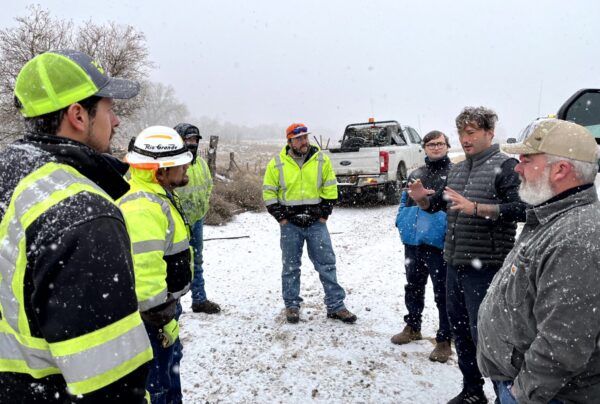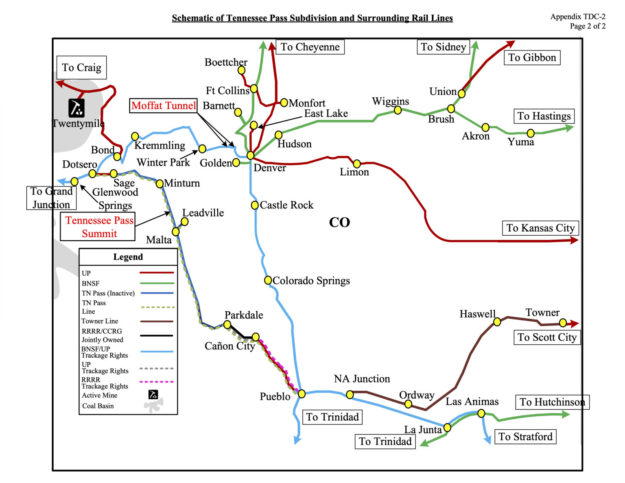Billionaire trying to revive Tennessee Pass rail line acquires another railroad in southern Colorado

Stefan Soloviev, the billionaire New York developer and Colorado agricultural landowner who first revived interest in the dormant Tennessee Pass rail line through Eagle County in 2018, is on the verge of acquiring yet another railroad in the southern part of the state.
According to the Alamosa Valley Courier, Soloviev earlier this month swooped in at the last minute to enter the winning bankruptcy bid on the 154-mile San Luis Rio Grande (SLRG) railroad from Walsenburg to Antonito through Alamosa. U.S. Bankruptcy Judge Thomas McNamara on Tuesday signed an order approving the sale to Soloviev for $10.7 million.
Adding the SLRG to his 122-mile Towner Line from Towner to North Avondale Junction near Pueblo increases Soloviev’s Colorado rail quiver to 276 miles of track.
Starting in 2018, Soloviev’s Colorado Pacific Railroad, a subsidiary of his massive KCVN holding company, also tried to acquire from Union Pacific 208 miles of the dormant Tennessee Pass Line from Pueblo to Dotsero in western Eagle County so he could ship grain from his farms in eastern Colorado and western Kansas to West Coast ports. That line runs right through Leadville, Minturn, Avon, Eagle and Gypsum but has been dormant since 1997.
Colorado Pacific Railroad (CPRR) declined to comment on Soloviev’s pending acquisition of the San Luis Rio Grande (SLRG) railroad and whether it would make his pursuit of the UP’s Tennessee Pass Line more or less urgent but did confirm the SLRG has no western connection.
In a text message, Soloviev reportedly told the Alamosa Valley Courier, “I’m very pleased and very proud to be the new owner of the SLRG Railroad, implementing it with the CPRR and working with the people of Colorado on a personal level as I have since arriving in this region 23 years ago. This is just another piece to the larger part of creating the first ever vertically integrated agricultural business. From seed to farming to harvest to storage to rail to a dedicated port to vessel to end-user, wherever that end-user is in the world.”
As it stands, Soloviev is still reliant on Union Pacific to move his grain north from near Pueblo, along the Front Range to Denver, and then west on the UP’s active central line, which crosses the Continental Divide at the Moffat Tunnel and then moves west along the Colorado River, where it connects with the dormant Tennessee Pass Line at Dotsero before heading to Glenwood.

In late 2020, Soloviev, who inherited a vast New York City real estate fortune from his late father, Sheldon Solow, upped the ante in his bid for the Tennessee Pass Line by offering daily passenger service between Pueblo and Minturn and easements for recreation paths along the line.
In an interview with RealVail.com at the time, Soloviev said he knew it would be a tougher battle with Class 1 railroad giant Union Pacific compared to what he experienced in acquiring the Towner Line: “Obviously, it’s going be a lot harder. We’re the underdog, and it’s David going against the Goliath and you’ve got to root for David here.”
Soloviev later challenged UP’s deal with short-line operator Rio Grande Pacific and the newly formed (and confusingly named, he alleged) Colorado Midland & Pacific Railroad to run limited passenger and freight service on a section of the Tennessee Pass Line between Sage (near the Eagle County Regional Airport) to Parkdale, just west of the Royal Gorge.
That move would have blocked a through connection from Pueblo to Dotsero and maintained what Soloviev deemed UP’s “monopoly stranglehold” on grain transport through Colorado.
The federal Surface Transportation Board (STB) in March of last year rejected UP’s application for an expedited lease deal, ruling it was far too controversial to revive the long-dormant line along the Eagle and Arkansas rivers and would require much more environmental review.
UP and Rio Grande Pacific, which is also pursuing a new 85-mile rail connection to oil fields in northeast Utah, remain interested in working with Colorado counties and towns along the Tennessee Pass Line to revive passenger and limited freight service. Soloviev, who previously offered $10 million for the line, remains interested in a through freight connection.
Eagle County officials, meanwhile, don’t like the idea of up to 10 oil trains rumbling through the northwest corner of the county every day, so they’ve sued to stop Rio Grande Pacific’s Uinta Basin Railway – the 85-mile connection that would send Utah’s waxy crude oil in heated tanker cars along the Colorado River, down into Denver and then on to refineries on the Gulf Coast.
As bad as they say oil trains (more likely now due to surging crude prices) would be on the banks of the Colorado River, Eagle County officials are also worried the Utah project will increase pressure on Union Pacific to revive the Tennessee Pass Line. While Rio Grande Pacific officials say their interest in the line has nothing to do with oil, even trying to get the feds to exclude its transport, other observers of federal rail law argue it’s not so simple.
Certainly writing off the possibility of oil transport or other hazardous materials on the Tennessee Pass Line if it’s revived as mere rumor-mongering requires closer examination. In a recent Colorado Springs Gazette story, Vail Mayor Kim Langmaid and Leadville Mayor Greg Labbe liked the idea of passenger rail on sections of the dormant line.
Eagle County Commissioner Matt Scherr expressed some skepticism in the story, pointing to the need for scarce public funding to subsidize passenger rail and questioning the demand for service from Pueblo to Vail. Scherr is a former mayor of Minturn, which was a bustling rail and mining town in the late 19th and early 20th century but a funky ski and tourism town in the 21st.
The state is far more focused on passenger rail along the far more populous Front Range from Fort Collins to Pueblo, seeking Amtrak and other funding sources to accomplish that goal.
At the national level, Colorado’s Democratic members of Congress have repeatedly opposed a surge of oil trains traveling along the state’s most iconic rivers, lobbying the Biden administration to put a halt to the Utah plan, which has near-universal support in that conservative state. Several December deadlines are looming in the Eagle County lawsuit.
All of this comes as federal officials are pushing the nation’s Class 1 railroads such as Union Pacific to fix labor and embargo issues that are causing major supply chain snarls nationwide and thereby exacerbating inflation and worsening economic problems for millions of Americans.
It’s important to remember that the federal government OK’d the Union Pacific-Southern Pacific merger in 1996 amid its very clearly expressed reservations about the merger’s impact on competition. The feds did not allow UP to abandon the Tennessee Pass Line for that very reason.
Soloviev, meanwhile, is clearly playing a long game in Colorado, touting his agenda of freight competition, lower shipping costs, getting trucks off overburdened Colorado highways, reducing carbon emissions and bringing recreation path and passenger rail benefits along with his grain trains. While he’s earning splashier headlines in his native New York for a major Manhattan casino and museum project, his less-heralded addition of another Colorado railroad may wind up being a much more significant development in his bid to remake the nation’s grain shipping and rail system.
Editor’s note: This story has been updated with a photo of Soloviev from Tuesday atop La Veta Pass and the signing Tuesday by a U.S. Bankruptcy Court judge of an order approving the sale of the San Luis Rio Grande (SLRG) railroad to Soloviev for $10.7 million.
Editor’s note 2: This story was updated on Nov. 30 with the purchase price of $10.7 million (not $10.5 million) and the elevation of La Veta Pass as 9,242 feet (not 9,220). In addition, the following is the official press release from the Soloviev Group on Tuesday’s purchase approval:
Alamosa, CO, November 30, 2022 – A federal judge Tuesday approved the Soloviev Group’s purchase out of bankruptcy of the San Luis & Rio Grande Railroad pursuant to a November 17th auction.
The company’s winning bid of $10.7 million by the group through its subsidiary KCVN LLC was nearly double the opening auction bid.
The line is about 150 miles long, radiating in three directions from Alamosa, Colorado, with connection to larger railroads at Walsenburg, Colorado. Freight traffic includes grain, minerals, rock products, and farm produce.
Operating across the La Veta Pass at an elevation of 9242 feet, it is the highest railroad in the United States. The railroad first reached Alamosa as a narrow-gauge line built by the Denver & Rio Grande Railroad in 1878, and has been in continuous operation ever since.
“We look forward to working with shippers in the territory served by the line to meet their agricultural and other transport needs efficiently and cost-effectively. We are planning significant upgrades to the service so the line can operate at the highest possible level of efficiency,” said Stefan Soloviev, chairman of the Soloviev Group.
The Soloviev Group also owns and operates the Colorado Pacific Railroad, from a point east of Pueblo, Colorado, to the Kansas state line. Both railroads heavily serve agricultural interests.
The parent company is one of the largest landowners in America, owning or controlling more than a half million acres of farm and ranchland located primarily in Colorado, Kansas and New Mexico.
“The Soloviev Group looks forward to serving the needs of agricultural and other freight customers in the five-county area served by the San Luis & Rio Grande Railroad and will be involved and work with the local communities,” Soloviev said.


Latest posts by David O. Williams (see all)
- During National Small Business Month, Target, DreamSpring put funding bullseye on underrepresented communities in Denver area - May 29, 2025
- Colorado senator urges Supreme Court to hold Trump administration in contempt on deportations - April 19, 2025
- Conductor who brought back Colorado ski train wants to use rail to save state’s highways for skiing - March 20, 2025

You must be logged in to post a comment Login